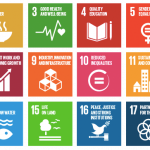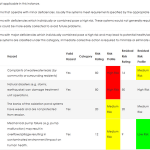Piloting of National Treasury MFMA Circular No. 88: Water & Sanitation PIs through the MBI and City Water Managers Forum
WSA interaction is via peer networks, and for a peer network to be successful, the WSAs must know the strategic purpose of participating. Peer networks are encouraged to start small (low hanging fruit), learn and build upon successes. The MBI Cities Working Groups (CWGs) were established to allow the nine municipalities that form part of the already well-established City Water Managers’ Forum (i.e. eight metropolitan municipalities plus Msunduzi) an opportunity to present and discuss their status and solutions to common challenges, with a view to learn from each other and improve their performance.
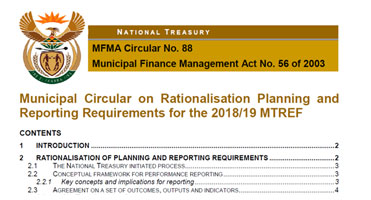 National Treasury (NT) is driving a local government financial and budgeting reform process. As part of this process, the City Support Programme (CSP) of National Treasury initiated the Reporting Reforms Project for Cities, particularly in relation to build environment functions. This was to: (i) Review and rationalize the multitude of uncoordinated indicators and requests for data by national departments to metros, and (ii) Further develop indicators at the output and outcome level. The process included several consultative bilateral engagements with both sectoral departments and cities including technical review and refinement of indicators and associated descriptors.
National Treasury (NT) is driving a local government financial and budgeting reform process. As part of this process, the City Support Programme (CSP) of National Treasury initiated the Reporting Reforms Project for Cities, particularly in relation to build environment functions. This was to: (i) Review and rationalize the multitude of uncoordinated indicators and requests for data by national departments to metros, and (ii) Further develop indicators at the output and outcome level. The process included several consultative bilateral engagements with both sectoral departments and cities including technical review and refinement of indicators and associated descriptors.
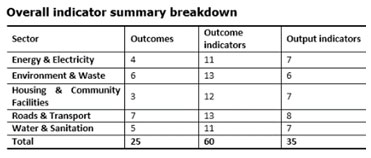 The Department of Water and Sanitation (DWS), as sector leader, was a proactive custodian of the process, and the SALGA/WRC Municipal Benchmarking Initiative (MBI) provided valuable inputs in defining appropriate indicators and ensuring sector alignment. The process aimed to find a balance between international alignment and strategic prioritization (e.g. to SDGs, AMCOW, ISO, MTSF, etc.), while acknowledging data system realities, stakeholder inputs and current capabilities. The process has initially focused on cities (Metros) due to their strategic significance, but the intention is to more broadly implement these reporting reforms at all municipalities. Through the process, indicators have been developed for five municipal sectors, including Water & Sanitation. Finalized PIs were accepted (excluding Governance) at the end of November 2017 via the MFMA Circular No. 88. In addition to the PIs, detailed technical indicator descriptions were included for each indicator and associated data elements. As per the NT MFMA Circular No. 88, indicators have been developed for five municipal sectors.
The Department of Water and Sanitation (DWS), as sector leader, was a proactive custodian of the process, and the SALGA/WRC Municipal Benchmarking Initiative (MBI) provided valuable inputs in defining appropriate indicators and ensuring sector alignment. The process aimed to find a balance between international alignment and strategic prioritization (e.g. to SDGs, AMCOW, ISO, MTSF, etc.), while acknowledging data system realities, stakeholder inputs and current capabilities. The process has initially focused on cities (Metros) due to their strategic significance, but the intention is to more broadly implement these reporting reforms at all municipalities. Through the process, indicators have been developed for five municipal sectors, including Water & Sanitation. Finalized PIs were accepted (excluding Governance) at the end of November 2017 via the MFMA Circular No. 88. In addition to the PIs, detailed technical indicator descriptions were included for each indicator and associated data elements. As per the NT MFMA Circular No. 88, indicators have been developed for five municipal sectors.
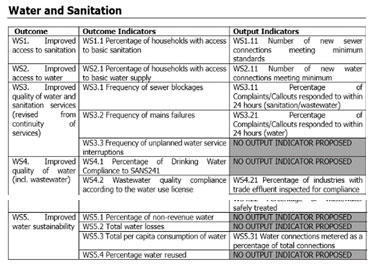 18 Water and Sanitation PIs have been developed (11 outcome indicators and 7 output indicators). These indicators are associated with 5 outcomes, namely:
18 Water and Sanitation PIs have been developed (11 outcome indicators and 7 output indicators). These indicators are associated with 5 outcomes, namely:
- WS1 – Improved access to sanitation
- WS2 – Improved access to water
- WS3 – Improved quality of water and sanitation services
- WS4 – Improved quality of water (incl. wastewater)
At the request of the City Water Managers Forum, once the PIs were finalised they would be piloted amongst the Metros on the Munibench and be the basis of City Working Group engagements. Subsequently, DWS in conjunction with the SALGA/WRC MBI and NT have trialled these indicators via the CWGs and using the Munibench.
The main objectives of the piloting process was to determine if: (i) There any data/PI misunderstandings / hiccups? (ii) Metros are ready for the 2018/2019 reporting cycle (required to report on all Tier 1 and Tier 2 PIs)?
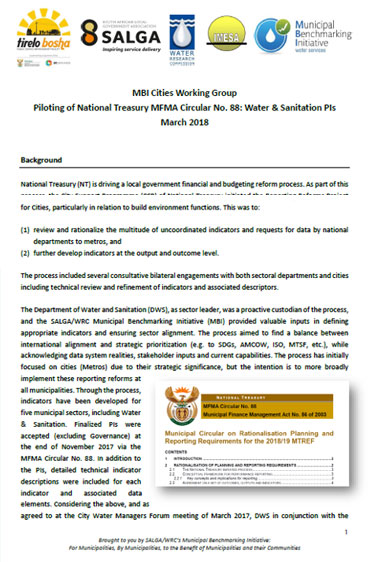 In preparation for the required reporting by Metros in the 2018/2019 cycle, the MBI team provided the cities with a data template, requested data for 2015/2016, and asked cities to complete all data fields (irrespective of Tiers, and to test if data is available or not, and if there is any difficulty with definitions). This data was used to generate a draft report with preliminary analysis of the data provided for discussion with participants at the meeting.
In preparation for the required reporting by Metros in the 2018/2019 cycle, the MBI team provided the cities with a data template, requested data for 2015/2016, and asked cities to complete all data fields (irrespective of Tiers, and to test if data is available or not, and if there is any difficulty with definitions). This data was used to generate a draft report with preliminary analysis of the data provided for discussion with participants at the meeting.
From the initial data collection round, data was received from 8 of the 9 participants. No city provided all data (i.e. all 45 required data elements used to calculate the 18 PIs), and some questions regarding definitions arose. In particular, key questions arising included:
- Process to amend PIs/definitions as per MFMA Circular No. 88?
- Are we measuring all required variables?
- Are we ready to report Tier 1 and Tier 2?
- What is needed to ensure we can report Tier 3?
- Process to generate regular updated PI performance for CWGs/City Water Managers Forum (i.e. standing Agenda item)?
The findings from the process will be used to: (i) further refine the indicators (if required), and (ii) assess the applicability of indicator roll-out to all NT 17 municipalities and then to all municipalities.
This is an exciting and very valuable sector alignment which will greatly reduce reporting burdens by Metros (and potentially other municipalities) to sector leaders and partners.
For further information on the MBI, or if you would like to get involved, please contact us.




